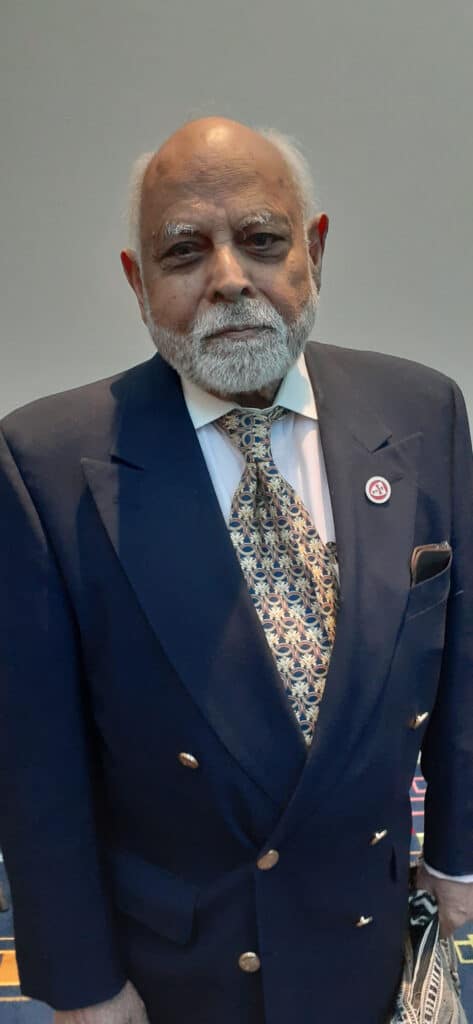
Mr. Abner Bishamber Lall, told of seeing the Union Jack flag lowered and India’s flag raised for the first time in 1947 when he was 15 years old, photo (c) Robert Kalfus
By Robert Kalfus
The Westchester Music of India (MOI) Group, founded as an all-volunteer group in 2014, has successfully performed to an Indo-American model for MOI combining Western style chorus singing with fusion of Indian and Western instruments.
This past Sunday was the ninth and a historic performance, performing with a live orchestra of Western instruments augmented with certain Indian instruments, billed as “A Celebration of India’s 75 Years of Independence with Joy and Brotherhood”, at the PepsiCo Theatre, SUNY at Purchase, NY. In 1947, India and South Asian nations found freedom from colonial rule, when Great Britain’s Union Jack flag came down and India’s flag was raised.
Jawalharial Nehru was sworn in as India’s first Prime Minister by Great Britain’s Lord Mountbatten, on August 14, 1947. Later than night, Independence night, August 14, 1947, Prime Minister Nehru spoke at midnight, saying “At the stroke of the midnight hour, when the world sleeps, India will awake to life and freedom.” The first morning of an independent India was August 15, 1947.
Mr. Abner Bishamber Lall, age 91, delivered a rousing and heartfelt speech to the hundreds attending the performance, remembering “I was a 15 year old boy, in 1947, when I saw the two flags of the Union Jacks descend, and then the twin flags of India’s Independence raised for the first time.”
In the summer of 1785, German composer Friedrich Schiller wrote the poem Ode to Joy as a celebration of the unity of all mankind. Ludwig van Beethoven Beethoven chose it for the fourth movement of his Ninth Symphony, and Ode to Joy was first performed May 7, 1824 in Vienna. The Ode’s theme of of humans as free and rational beings and the sanctity of brotherhood and peace closely aligned with Beethoven’s won beliefs. Symphony No. 9 was also the first time ever that human voice was included in a symphony.
Over the years, Beethoven’s Ode to Joy has remained a protest anthem and a celebration of music and an expression for freedom of the human spirit. Protesters in Chile sang the piece during a demonstration against the Pinochet dictatorship. Chinese students broadcast it at Tiananmen Square. Leonard Bernstein, the former conductor of the New York Philharmonic, conducted it at a special concert in the German capitol on Christmas Day after the fall of the Berlin Wall.
The Joy and Brotherhood program displayed twelve different songs, all sung in India’s national language of Hindi, and after an intermission, Ludwig van Beethoven’s Ode to Joy was featured its historic first world’s premiere performance, sung in Hindi! and conducted by Avinash Lall, who worked for months with the assistance of David Baranowski, conductor of the Hudson Chorale, and Wil Dannenberg, assistant conductor, for preparing the chorus to sing in Hindi for this performance. MOI gratefully thanked the Hudson Chorale, the Westchester Choral Society, Hudson Valley Singers, Westchester Chordsmen, Christ Church Tarrytown, the Yonkers Philharmonic Orchestra, the India Center of Westchester, and the MOI Orchestra, all whom contributed to this magnificent performance.
MOI welcomes all singers and instrument players to contact the website www.WestchesterMOI.org and at info@WestchesterMOI.org, and can be viewed on Facebook.





